Brussels – It has always been one of the hottest topics on the tables of the EU institutions, sizzling since February 2022: a common foreign policy among the 27 Member States has assumed the starring role in the election campaign ahead of the June 6-9 vote for the renewal of the EU Parliament, as is evident from all the programs of the European political families (except for Identity and Democracy, which chose not to adopt a common one for its member parties). From the Russian war in Ukraine, which has distorted the conception of security and the role of the EU in the world after the Covid-19 pandemic, to the crisis in the Middle East and Israel’s continued siege of the Gaza Strip not forgetting the Chinese giant that has never ceased to worry the Union and its member countries. With one word resonating in (almost) all election programs, even if in different ways and with different implications: peace.
The EPP, between support for Ukraine and an EU foreign minister
The Manifesto of the European People’s Party (EPP) for the 2024 European elections makes a paradigmatic debut on the foreign policy front: “Our Europe stands with Ukraine.” The continuation and amplification of “political, economic, humanitarian, and military support for as long as necessary” remains central, with the view that Kyiv “must win the war.” Since the war in Ukraine “is directly related to European security,” for the European Populars, Kyiv should “become a member of the EU and NATO as soon as it meets all the criteria.” At the same time, the scope of the sanctions regime against Vladimir Putin‘s Russia and against the circumvention of sanctions will have to be “further” strengthened “where and when necessary.” In this regard, on the global level, the EPP calls for “abandoning the principle of unanimity in the field of EU sanctions against totalitarian regimes in the world.”
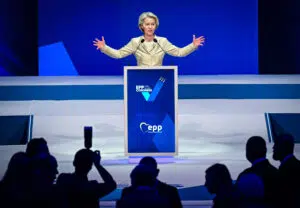
But the most significant proposal is to “replace the High Representative with an EU foreign minister, as Vice-President of the European Commission,” who would work “closely” with national counterparts and with a “European Security Council composed of the leaders of EU member states and other European countries, including “at least the United Kingdom, Norway, and Iceland.” There is also a brief passage on the Middle East conflict – without any reference to Israel or possible solutions to the crisis – referring only to the “enormous challenges on the world stage” and the “recent instability caused by the Iranian regime.” It calls for a “long-term strategy” towards China and Taiwan, Russia and Belarus, Africa, Latin America, the Mediterranean region and the Middle East and to define “Europe’s interests in order to have a coherent foreign policy in which all member states must be considered and their interests protected.” More meaty is the paragraph on Cyprus and the need to “break the deadlock and resume negotiations to end the occupation by Turkey,” pushing for a reunification of the island “on the basis of a bizonal bicommunal federation, with political equality.”
The PES, between peace and international cooperation
“The EU must speak with one voice in foreign policy matters and move towards more majority decisions in certain policy matters,” begins the foreign policy chapter in the Manifesto of the Party of European Socialism (PES) for the 2024 European Elections, without explicitly putting in black and white the urgency of moving away from unanimity in the Council on some issues (such as sanctions). In parallel with strengthening the EU’s “diplomatic and political role on the global stage,” the European Socialists push for “resolving longstanding conflicts worldwide and in Europe, including in Cyprus,” but on the Ukrainian issue, there is no room for doubt: “We maintain our unwavering support for Ukraine, providing political, humanitarian, financial, and military assistance for as long as necessary,” with the ultimate goals of “restoring its territorial integrity” and achieving a “just and sustainable peace.”
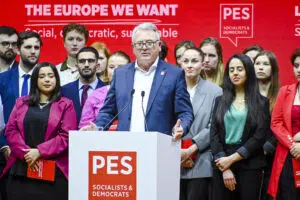
Regarding multilateral order and peace, the PES dwells on the work needed to “end conflict, instability, and humanitarian tragedies in the Middle East,” in particular through an “international peace conference to reach a just two-state solution between Israelis and Palestinians that respects the rights and duties of the two peoples.” Meanwhile, it calls for initiatives leading to a “sustainable” ceasefire. Relations with China require rebalancing, “promoting our values and protecting our interests,” and “further cooperating to address pressing global issues.” The focus is also on building “a new partnership of equals” with the global South, a “revitalized” Euro-Mediterranean partnership, and a “new progressive EU-Latin America agenda,” all including “strong support for the International Labor Organization.”
Renew Europe and the Global Alliance of Democracies
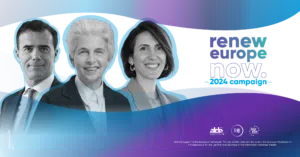
In the run-up to the European elections in June, foreign policy also finds space among the 10 priorità of Renew Europe. “Today autocratic regimes around the world proudly claim they are here to stay, attack democracies and are ready to assert themselves,” is the European liberals’ warning about the betrayed hopes of liberalism, democracy and free markets after the Cold War. The counterattack starts with a union of democracies “to defend their common goals beyond geographical interests.” In other words – albeit without more details about it – Renew Europe intends to build “a Global Alliance of Democracies that strengthens the EU’s global influence in order to promote our values,” based on “partnerships with like-minded countries.”
The Greens and the peace contract for Europe
“The full-scale Russian invasion of Ukraine was a turning point in the history of our continent and the world. It violates the rule of international law, peace, and security,” reads the Manifesto of the European Green Party for the 2024 European elections, opening the long chapter on foreign policy. Unwavering solidarity with Kyiv – “the struggle of the Ukrainian people for freedom, peace, and membership in the European Union is our struggle” – but the party goes beyond and speaks of the “painful conflicts raging in the Middle East, the Caucasus, the Sahel, and Central Africa.” It calls for the EU to be “a strong actor” but in line with its nature as a “peace project.” In this context, after European elections, it proposes a “peace contract” for Europe, in which the “climate-security nexus” takes on particular prominence to ensure that “Europe’s green transition is a geopolitical tool and a global responsibility” and that military interventions are “always and only a last resort.”
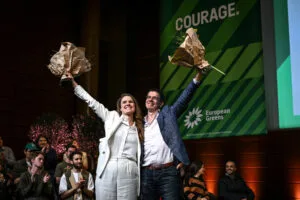
The Manifesto gives ample space to the Middle East conflict, for which the European Greens urge the EU to “relaunch political negotiations for a two-state solution, based on secure and agreed borders” since a “lasting” peace in the region requires “negotiating outcomes that respect the right of Israel and Palestine to exist as democratic and sovereign states and of the Palestinian people to have a home of their own.” Foreign policy in the European Greens’ election program includes a strong indication not to “be complacent about economic dependence on authoritarian regimes” such as Putin’s Russia: “We will make sure that Europe does not make the same mistake again with other belligerent regimes in the world.” Not insignificantly, the “threat posed by China towards Taiwan, which endangers international peace and security” is mentioned immediately after. In response, “an active, clear, and common European policy” is called for, but without denying that “interdependence is a key factor for a peaceful international system and a just global transition.”
Ecr for a “nuanced foreign policy”
The keywords for the foreign policy of the European Conservative and Reformist Party (Ecr) are “security” but also “nuanced.” So reads the appropriate chapter of the Manifesto ahead of the June European elections on one of the most sensitive issues for the European Union: “In navigating relations with China, the ECR takes a nuanced stance.” On the one hand, it acknowledges the “need for engagement,” including to “address human rights violations,” on the other, there is a desire to “sustain stronger ties with Taiwan and other like-minded partners in the Pacific region.” It does not refer to Russia’s war in Ukraine, addressed under European defense. It calls for a “more assertive” policy toward Iran, “focusing on its nuclear programs and state-sponsored terrorism.” In addition to closer cooperation “between the EU, the global West, and the UK,” European conservatives are distinguished by the “priority” of “protecting persecuted Christians around the world” and “defending religious freedom,” although, even here, a veil of ambiguity remains: “Our approach to promoting our common interests is nuanced.”
The Left Between Rejection of War and Russia-United States Sanctions
“Peace” is the hinge principle on which the entire foreign policy chapter of the European Left Party‘s Manifesto toward the June Europeans is based. Not insignificant is the outright condemnation of Russian military aggression against Ukraine, “which is a crime under international humanitarian law,” and the outlining of “immediate steps” to end the war: “A return to the negotiating table, a cease-fire, and the withdrawal of all Russian troops from Ukraine.” Support for sanctions against “the Russian military-industrial complex” offers a bridge between the issue of the war in Ukraine and the war in the Middle East: “We call for sanctions against the U.S. military-industrial complex for supporting the aggression of the government of the State of Israel,” as well as restrictive measures toward Israel. “An immediate cease-fire, the provision of humanitarian aid to the people of Gaza, and the immediate withdrawal of Israel from all the territories it occupies” are the demands of the European Left, which does not lose sight of the “22 other wars” going on in the world: “We are living through a ‘world war in installments’ that could quickly escalate into a global nuclear disaster.”
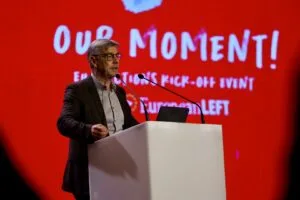
Among the proposals to prevent Europe from becoming “the arena of a new cold war and arms race,” there is the inclusion of the rejection of war as a means of resolving international disputes among the fundamental principles of the EU, “no new nuclear weapons” on the continent, and assuming “responsibility for its security autonomously and independently of the United States.” Also of note is support for the “aspirations of the Irish people to reunite their nation divided by British colonialism” and “an end to the Turkish occupation of Cyprus and the reunification of the country.” The Left’s foreign policy also considers the “cancellation of the gas contract between the EU and Azerbaijan,” action against the “economic, financial, and trade” embargo against Cuba, an end to Turkish aggression against the Kurdish people, and condemnation of Morocco’s occupation of Western Sahara. Finally, ample space is reserved for the issues of “co-development and non-domination” in relations with the rest of the world: “We call on the EU to break with its style of neo-colonial domination and to relaunch its trade and financial relations with the global South on a new basis,” based on “the cancellation of free trade agreements” (at the EU level) and “Covid debt” (at the member state level) and the “creation of a European Fund for ecological and social co-development, financed by the ECB.”
English version by the Translation Service of Withub




![Il presidente della Repubblica, Sergio Mattarella, con la presidente della Commissione europea, Ursula von der Leyen [Bruxelles, 21 maggio 2025. Foto: Emanuele Bonini per Eunews]](https://www.eunews.it/wp-content/uploads/2025/05/mattarella-vdl-120x86.png)


![Il presidente della Repubblica, Sergio Mattarella (sinistra), con il presidente del Consiglio Europeo, Antonio Costa [Bruxelles, 20 maggio 2025. Foto: Quirinale]](https://www.eunews.it/wp-content/uploads/2025/05/mattarella-costa-120x86.jpeg)